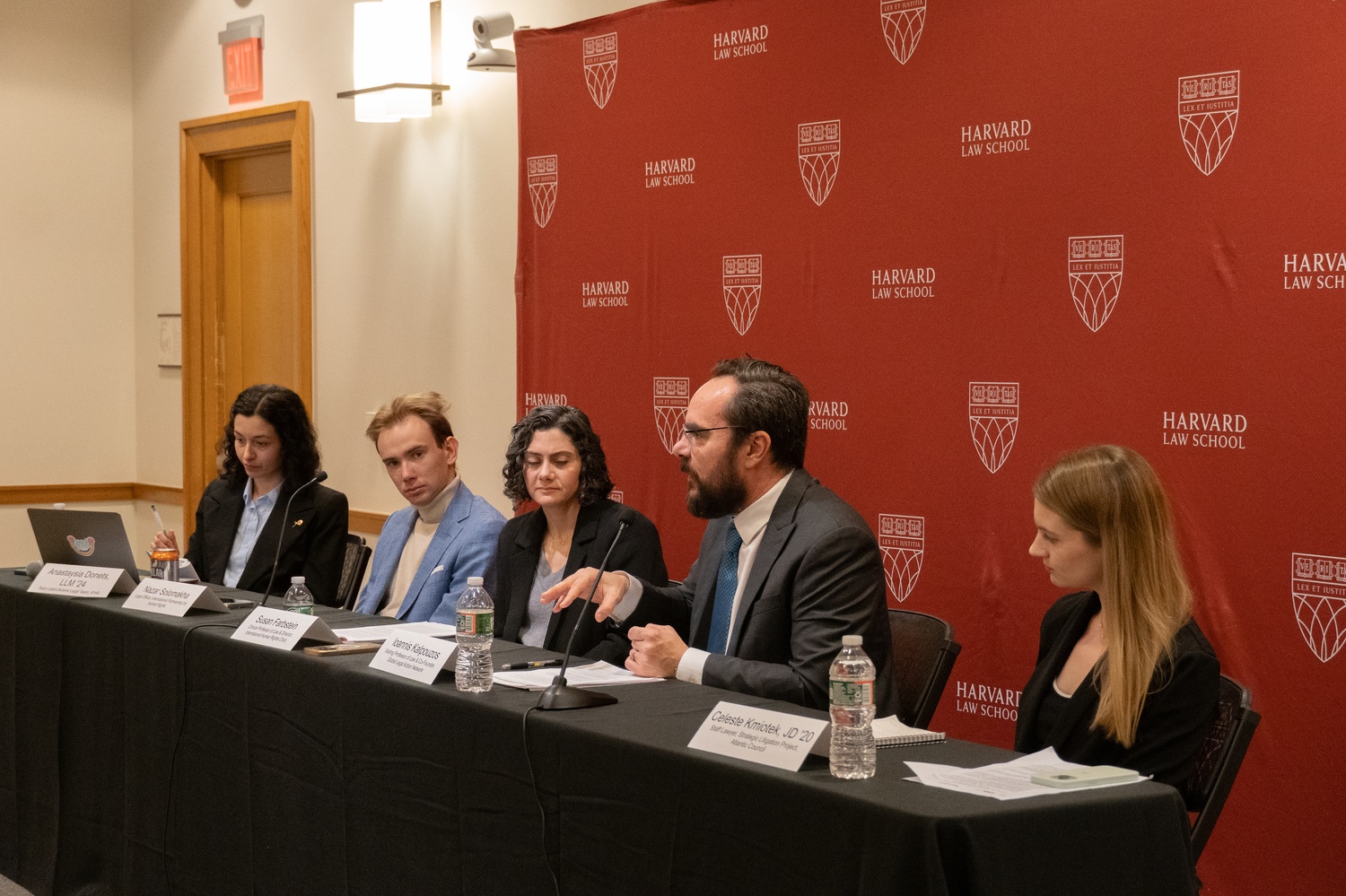
News
Nearly 200 Harvard Affiliates Rally on Widener Steps To Protest Arrest of Columbia Student

News
CPS Will Increase Staffing At Schools Receiving Kennedy-Longfellow Students

News
‘Feels Like Christmas’: Freshmen Revel in Annual Housing Day Festivities

News
Susan Wolf Delivers 2025 Mala Soloman Kamm Lecture in Ethics

News
Harvard Law School Students Pass Referendum Urging University To Divest From Israel
HLS Clinic To File War Crimes Complaint With ICC Against Russia

Harvard Law School Professor Susan Farbstein, director of Harvard’s International Human Rights Law Clinic, announced plans to submit evidence of Russian war crimes in Ukraine to the International Criminal Court at a Thursday panel.
Farbstein said the clinic plans to submit an Article 15 complaint to the ICC, alleging crimes against humanity, after documenting Russian military actions against civilians for over two years.
“This is a real chance for us, through our work, to help advance accountability,” Farbstein said.
Russia invaded Ukraine in February 2022, beginning the largest and deadliest conflict in Europe since World War II. The war is still ongoing, though U.S. President Donald Trump and Russian President Vladimir Putin agreed to begin peace negotiations on Wednesday.
Farbstein acknowledged that a period of rare polarization for the ICC may complicate the complaint process. Last week, Trump signed an executive order placing sanctions on the ICC for “illegitimate and baseless actions targeting America and our close ally Israel.” The ICC declared arrest warrants on Israeli Prime Minister Benjamin Netanyahu and former defense minister Yoav Gallant in November.
“We hope that, despite the recent executive order, that we will still be sending that in a few weeks,” Farbstein added.
The Thursday event, which was hosted by the IHRC, was moderated by Anastasiya Donets, an HLS graduate and head of the Ukraine Legal Team for the International Partnership for Human Rights. Atlantic Council lawyer Celeste Kmiotek, IPHR legal officer Nazar Solomakha and Ioannis Kalpouzo, co-founder of the Global Legal Action Network and a visiting professor at the law school, also spoke on the panel.
“We still have international interest in the situation in Ukraine and bringing Russia to account for its war of aggression and its crimes,” Donets said.
Farbstein said that Russia has made 223 attacks on “critical energy infrastructure” across Ukraine. “This is really about disrupting and destabilizing the entire energy system in Ukraine on such a scale that it's going to inflict profound harm on civilians,” she said.
The IHRC has been gathering evidence of Russia’s alleged war crimes through witness interviews and official statements. The team has been especially focused on analyzing the precision capabilities of Russia’s weapons to determine the scale of civilian attacks.
“These attacks are really intended to terrorize and demoralize Ukrainians so that they might either flee or surrender,” Farbstein said.
“When these weapons are used in a way that violates international law, that’s not because of some technical error, that’s not because of some glitch, that’s because they’ve been programmed and are being used in this precise way to hit these targets,” she said.
Farbstein also said that over 700 medical facilities and 1500 schools have been damaged or destroyed.
Kmiotek said that the IPHR’s research indicated that Iran was “aiding and abetting” in alleged Russian war crimes at the event.
Kmiotek said there are other potential avenues for accountability beyond the ICC, citing domestic jurisdictions with extraterritorial authority such as EuroJust, an investigative agency within the European Union.
“We’re hoping to submit to them, to even further broaden the scope and of who we're submitting to, and ensure that there's some kind of collaboration and make it more efficient,” Kmiotek added.
—Staff writer Caroline G. Hennigan can be reached at caroline.hennigan@thecrimson.com. Follow her on X @cghennigan.
—Staff writer Bradford D. Kimball can be reached at bradford.kimball@thecrimson.com.
Want to keep up with breaking news? Subscribe to our email newsletter.
Most Read
- With Federal Funds Stalled, Two Harvard School of Public Health Graduate Programs Reduce Admissions
- More Than Three-Quarters of Surveyed Harvard Faculty Identify As Liberal
- First They Came for Columbia
- Despite Funding Fears, Harvard To Expand Financial Aid Program
- 12 Men Accused of Buying Sex in Cambridge Brothel Ring Named, Charged in Hearing
